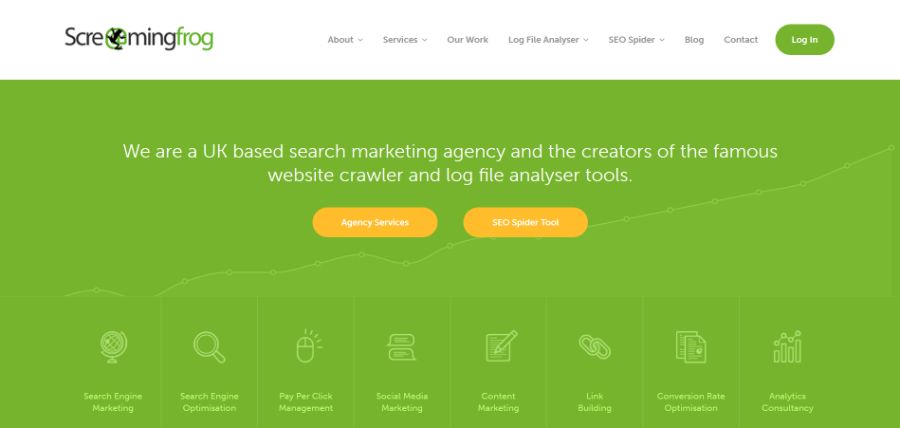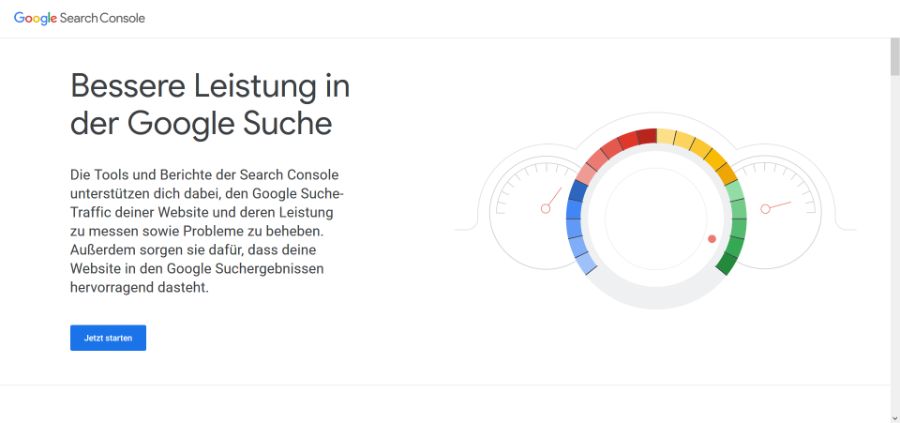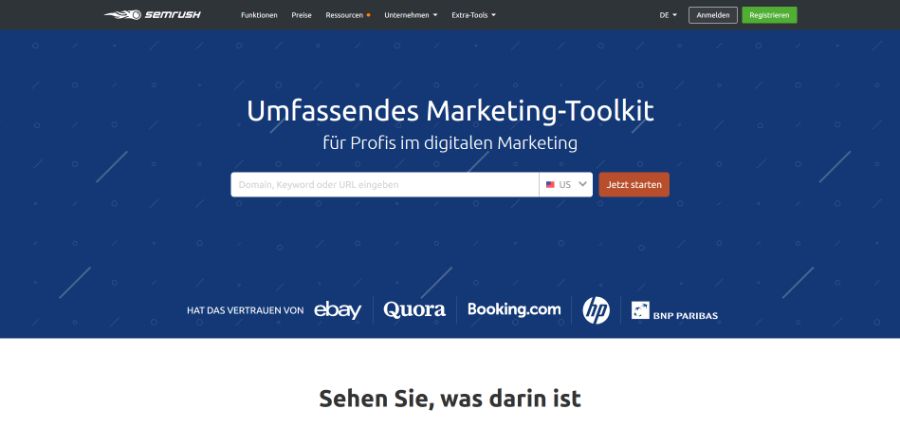Anyone who works in online retail or deals with search engines will certainly already be familiar with the term SEO. The abbreviation SEO stands for "search engine optimization".
Search engine optimization deals with the possibilities of optimizing the ranking of websites that can be found by search engines for certain search terms. Website operators such as online stores, service providers or bloggers can use search engine optimization to ensure that their offers for relevant search terms are seen by as many people as possible.
As most users either click on paid results or one of the first three organic results on search engines such as Google, web traffic is distributed across a small number of websites. The aim of SEO campaigns is therefore not only to identify relevant search terms for your website, but also to position yourself as high up as possible for these.
Due to the ever-increasing competition, it is not enough to rely on your gut feeling when it comes to SEO. Therefore, you not only need a professional strategy, but should also accept the help of SEO tools.
In this post, I will introduce some of the best free and paid SEO tools.
Free SEO tools
#1 Screaming Frog
Screaming Frog is installed as software on the PC. As a crawler, it searches a domain in a similar way to what you would expect from Google's crawler. You enter a URL, whereupon the crawler starts and from there it follows internal and external links until it has analyzed the entire website.
On its way through a domain, the SEO spider collects valuable data, such as server codes, which provide the webmaster with direct information about whether a URL is accessible or whether there are problems. The SEO spider also collects important data relating to each URL of a domain, such as titles and subheadings, as well as their length, number of words, number of inlinks and outlinks with anchor text, and the response time.
Thanks to these useful functions, the tool has become the industry standard for technical SEO audits. Although there are paid tools that enable even more detailed analyses and offer beautiful visualizations of the data, Screaming Frog's SEO Spider is absolutely sufficient, especially for smaller websites.
The free version of SEO Spider is limited to 500 URLS to be analyzed per domain.
#2 Google Search Console
Google Search Console is a free program offered by Google for website operators. It analyzes search queries for the website, click rates, problems of all kinds such as indexing problems, backlinks and much more. Google Search Console can help you to understand how your website is viewed and evaluated by Google.
Google recently added a new function to the Search Console, Core Web Vitals. This is actual usage data that provides information on the user-friendliness of a page.
It is also the only place where you will be informed about any penalties. Anyone who has ever had a website that is suddenly no longer displayed for relevant search terms should first take a look at the Search Console and see whether a penalty has been imposed. This way, webmasters can get rid of the penalty.
#3 Google Keyword Planner
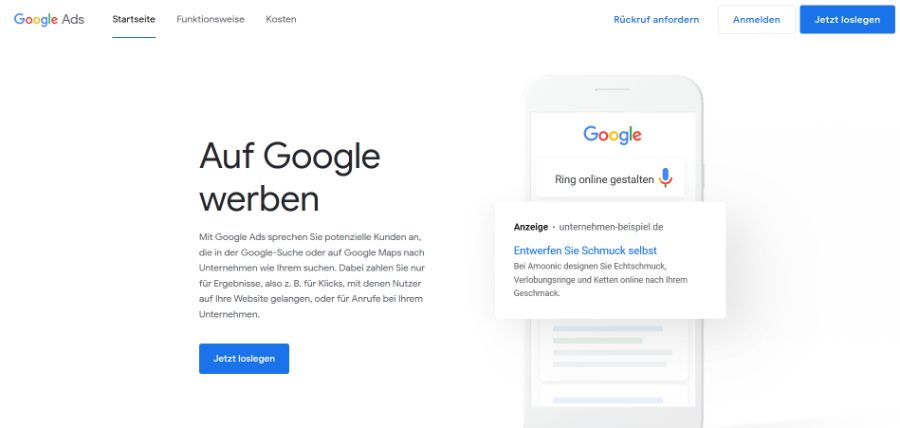
The Keyword Planner is provided by Google free of charge. Like Keyword Tool, this service relates to keywords and their performance. The Keyword Planner allows you to search for keywords by word groups and categories, which enables a broader search for different combinations. Search volumes and forecasts can also be called up with the Keyword Planner.
But beware: If you want precise information on the search volume, you have to place a paid Google Ads ad.
#4 Google Analytics

Some information that you can't get from Google Search Console can be found at Google Analytics. With the help of the Google Tag Manager, user interactions with the website can be tracked and, for example, clicks can be tracked. This is particularly important for affiliates so that they do not have to rely on the data from the affiliate program. Google Analytics is also suitable for CTR optimization or recording user journeys.
#5 Keyword Tool
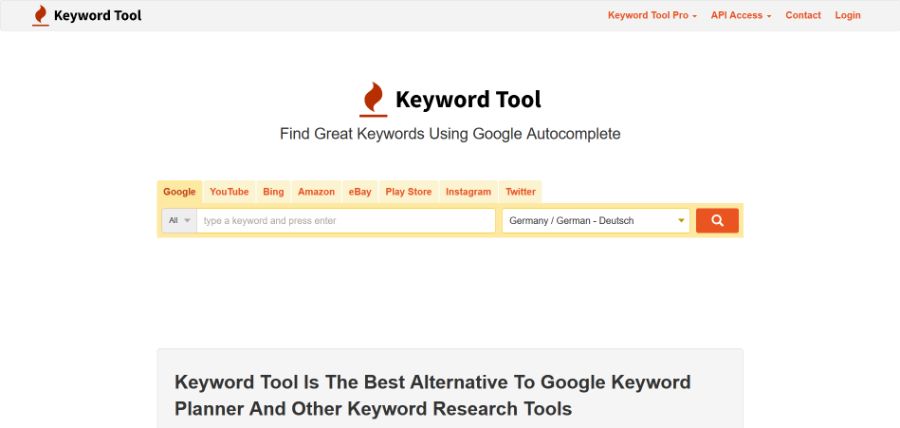
As the name suggests, the focus is on the Keyword Tool on the analysis of keywords. It quickly and effectively filters important keywords from Google and other platforms on which you want to be found. You don't need to create an account for this, you can start searching immediately. However, if you want data on the search volume and CPC of the keywords, you have to purchase the paid version.
The tool is therefore particularly useful for keyword research. However, the Ubersuggest tool can be used to obtain search volume free of charge.
#6 Ubersuggest

If you are looking for a tool for a very comprehensive and detailed analysis, then Ubersuggest in good hands. In addition to keyword research and analysis, content trends and backlink analysis, Ubersuggest also offers an analysis of competitors. Unlike other tools, you can view the strategies of other market players and implement them yourself.
Ubersuggest now relies on a freemium model. This means that users can use the tool free of charge, but only for a limited number of searches with limited results.
#7 Mozbar (Chrome extension)
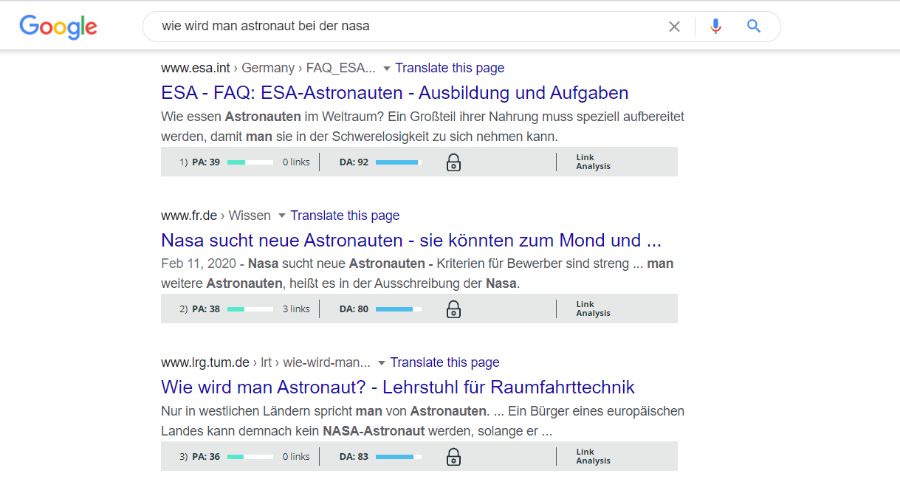
To Mozbar you need a Moz account. As soon as this is available, you can use Mozbar to analyze the domain and page authority and backlinks and export the results as a CSV file.
#8 WDF*IDF tools
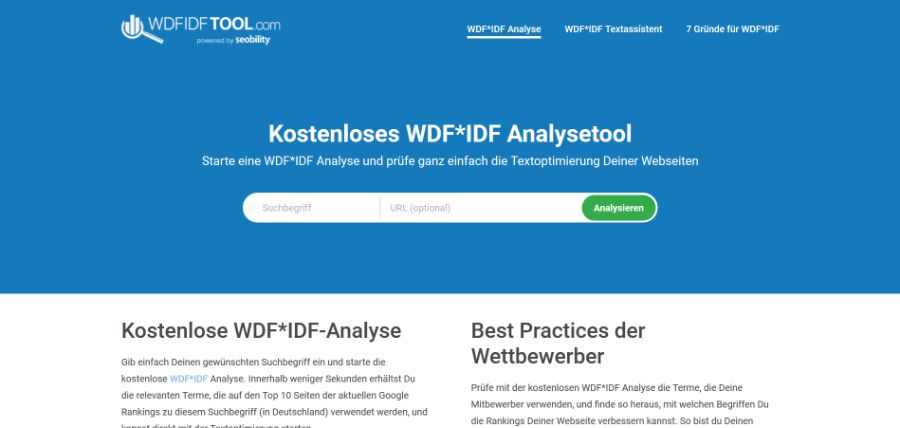
This type of analysis tool has already been mentioned. It is a tool for analyzing the Within Document Frequency (WDF) and the Inverse Document Frequency (IDF). These aspects analyze how often certain keywords are present in a text and how they compare in terms of their relevance for the text. Including relevant keywords in the text of a website is just as important for Google display as the keywords in the title or the stored keywords.
Paid SEO tools
#1 Sistrix
Sistrix is a very popular analysis tool. It offers a comprehensive analysis of the website ranking and visibility index. This is a measure of the performance of a website without being dependent on seasonal factors etc. The higher this value, the better the site performs in comparison with similar sites.
Sistrix is a comprehensive SEO solution similar to internationally renowned tools such as Ahrefs and SEMrush. This means that Sistrix has a crawler that crawls the web in a similar way to Google to collect SEO-relevant data. For example, Sistrix knows about backlinks, keywords or performance in social networks and users can view this data for their own site or the competition.
#2 Ahrefs

The international number 1 SEO tool offers all the features you know from Sistrix and a few more. So you can use Ahrefs instantly find competitors, identify backlinks that one or more of your competitors have but your site is missing, check up to 400 domains at once for backlinks, rankings etc. and much more.
However, the accuracy and completeness of the data is important when choosing a paid SEO tool. Paid tools usually have the edge here, as they recognize more links, capture more keywords and update rankings more frequently.
Compared to Sistrix, Ahrefs is clearly ahead in an international comparison, not least because of the useful domain ratings, which correlate strongly with rankings. However, Sistrix currently collects even more data for Germany, which may well be a decisive factor.
#3 SEMrush
SEMrush offers extensive keyword research, especially in relation to the successful keywords of the competition. This allows you to implement and further develop what is already working for your competitors. In addition to the competitors' keywords, SEMrush also takes a close look at the competitors' rankings and observes how and according to which criteria the best rankings change. This information can then be used for your own optimization.
SEMrush is considered a very good alternative to Ahrefs and offers more for the same price, especially for beginners, as well as an on-page module that Ahrefs lacks.
#4 MOZ
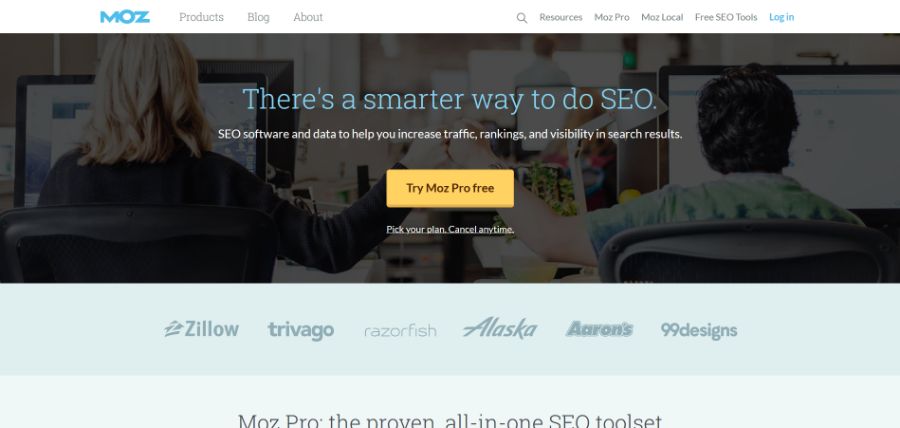
Long the leader among SEO tools is MOZ continues to be an excellent set of SEO tools that impresses with its reliable key figures such as Domain Authority (DA) and the Spam Score. Unfortunately, some functions, such as analyzing the rankings of a page on Google.de, are not available. This makes the tool less suitable for German website operators.
#5 Majestic
 The backlink tool is also popular with SEO professionals Majestic. If you mainly do link building or use free tools for keyword research, Majestic is a good choice, as this tool is powerful and comparatively inexpensive.
The backlink tool is also popular with SEO professionals Majestic. If you mainly do link building or use free tools for keyword research, Majestic is a good choice, as this tool is powerful and comparatively inexpensive.
However, the biggest advantage of Majestic is the so-called Topical Trust Flow. Majestic categorizes all websites according to topics such as sport, marketing or finance and sub-topics such as soccer, basketball, etc. The topical trust flow is then determined by the categories of the referring domains.
For example, you could expect to increase your topical trust flow in the sports/football section if you receive a link from the official Bundesliga website. However, this would not affect the Trust Flow in the Finance section.
In this way, Majestic helps to identify particularly relevant link sources or to locate unnatural link profiles.
#5 Searchmetrics
Searchmetrics enjoys a large following, including internationally. As you would expect, Searchmetrics covers many different aspects in its analysis. From keyword research to competitor comparison analyses, everything is included. Searchmetrics is characterized above all by the huge amount of accumulated data that is available to users of this tool. This also includes available marketing strategies that can be adopted and other unique features.
#6 XOVI
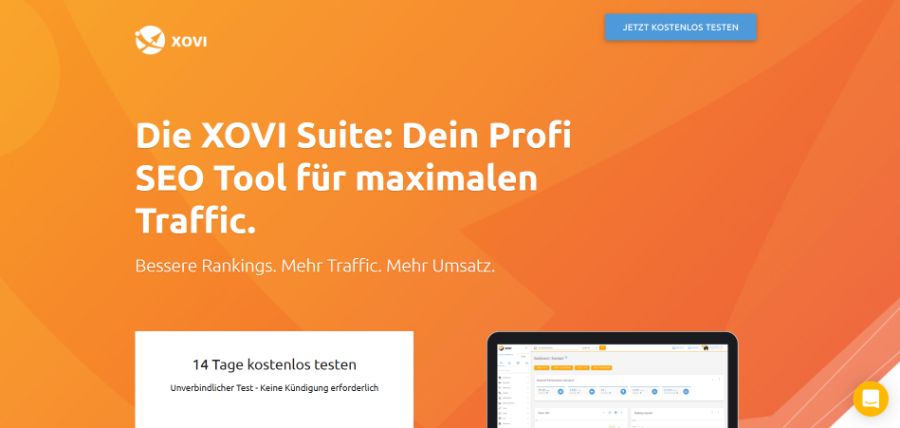
Within the analysis tool XOVI projects can be created for different websites or domains. In these projects, you can then determine which aspects the tool should focus on during the analysis. Keywords can be evaluated and their development monitored. XOVI also examines the visibility of the website. All aspects of on-page optimization can be considered, and XOVI also carries out links, social signals and WDF*IDF analyses.
#7 Seobility
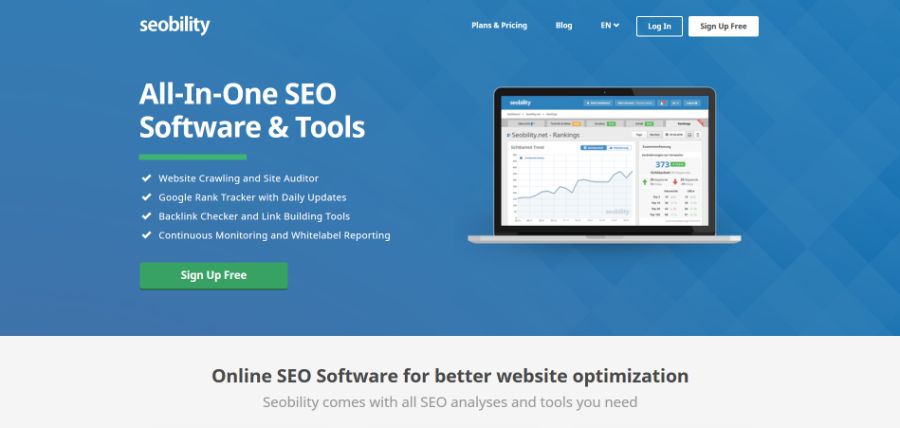
This tool offers a comprehensive analysis for on-page and off-page optimization. As a crawler searches Seobility the page to be optimized for errors and optimization opportunities regarding keywords, visibility of the website for certain keywords, meta data, links, duplicate content and much more. Seobility can also be used for WDF*IDF analyses.
#8 Ryte
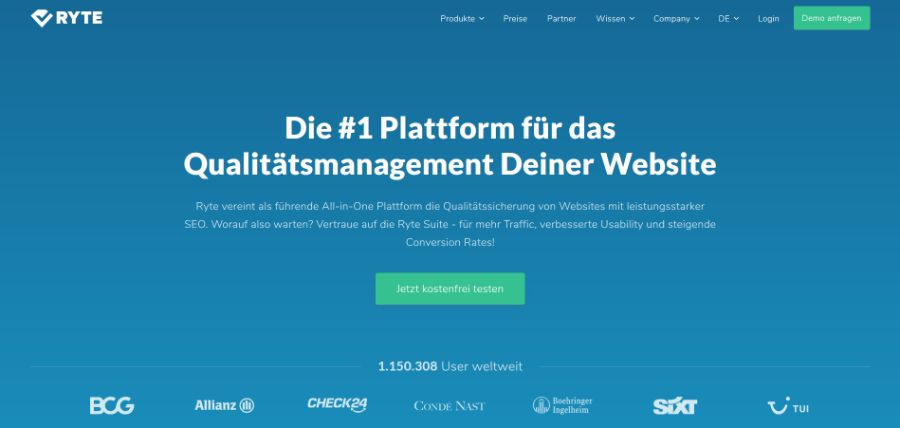
The SEO tool Ryte refers to three aspects in his analysis: Website Success, Content Success and Search Success. Within these three areas, Ryte analyzes your website for errors, content optimization options and the classic aspects of SEO for an optimal Google ranking. Ryte provides suggestions for improvement in each area, for example with suggestions for new content or keywords that can improve the ranking.
SEO tools can help you with this
SEO tools sometimes differ drastically from one another. Some are intended more for technical analysis, while others focus on links and still others specialize in keyword research.
In the following, I would like to describe the various functions of SEO tools in more detail.
Keyword research
Keywords are search terms that are used in a search query to find products or information. For online retailers, the aim of search engine optimization is to be optimally displayed for relevant keywords. To do this, we need to find out which keywords are used most by the target group. The ads displayed depend on the number and combination of keywords. For example, significantly different ads are displayed for the search term "sports shoes" than for the search term "sports shoes tennis" or "sports shoes tennis blue". If you are a distributor of sports shoes, you want to be displayed for search queries for sports shoes, whereas tennis clothing retailers want to be displayed for searches for tennis clothing.
Keyword research is therefore the basic building block of search engine optimization. It is essential in order to identify the interests and search inputs of the target group. If you learn to incorporate these effectively into your ads, you can expect increased traffic to your landing pages and increased sales.
Search volume of keywords
We can use keywords in Short-tail keywords and Long-tail keywords into different categories. These differ not only in the actual number of words they contain, but primarily in the search volume. Keywords that are less searched for but more specific are referred to as long-tail. While the frequently occurring keywords can be referred to as short-tail.
Example of short tail: Best TV
Example for long tail: Best 8K TV under €5,000
Of course, the search volume for a short-tail keyword is much higher than for a long-tail keyword. According to Ahrefs, the search volume for "best TV" in Germany is 1,300, while "best 8K TV under €5,000" has a search volume of between 0 and 10.
However, the search volume for the corresponding post would actually be higher, as it would also be visible for similar keywords.
Difficulty of a search term
Backlinks and the associated authority of a domain play a decisive role in determining the difficulty of a keyword. This must therefore be taken into account during keyword research.
Good SEO tools therefore offer parameters such as Domain Authority, Keyword Difficulty etc., which can be used to estimate how easy or difficult it will be to rank for a keyword.
SERP Features
Modern tools move with the times and have therefore recognized that Google's search engine features such as Google Ads, Map Pack, Features Snippet etc. can reduce organic clicks. For many searches, organic search results are no longer visible on smartphones without scrolling down.
As an online marketer, you should therefore already know exactly which features are active for which search term. Here too, Ahrefs is the tool with the most comprehensive information.
Technical audit
From an SEO perspective, a website needs three main characteristics:
- A solid technical foundation
- As many backlinks from strong websites as possible
- Content optimized for the Google algorithm
When it comes to technical analysis, you need help from tools that can scan websites for technical inconsistencies. Here are the most important things to look out for from a technical perspective:
Are some URLs not accessible?
Sometimes, for example, old posts that have already been deleted are no longer needed. In this case, all internal links that refer to this post must also be deleted. Otherwise, Google crawls the page but cannot find it. On the one hand, this is bad for your own readers and on the other, valuable crawl budget is wasted.
Length of Meta Titles
Are there posts without meta titles or are meta titles either too short or too long? Tools such as the SEO Spider from Screaming Frog can quickly identify titles that are too short or too long.
Loading time of individual URLs
There is hardly a worse sign for Google than a website that makes its users wait until the content becomes visible. Images, JavaScript, videos etc. can slow down a page. Slow servers and a clumsy server location can also cause long loading times.
301 Redirects
It is very important, especially for larger sites, that all 301 redirects are set correctly. Starting with the homepage, which should automatically redirect the user from http to https and from non-www to www (or vice versa), it can be advantageous to redirect outdated or no longer required posts to current posts on the same topic.
Broken links
It often happens that you refer to sources that are no longer available after a while. This can be the case internally, but also externally. These so-called broken links should be replaced with available resources.
Orphan Pages
Sometimes there are URLs that are not linked to by any other URLs. This means that there is no way for the Google Bot to find this page. The user cannot access this URL either. Orphan pages have 0 inbound links and can therefore be found quickly.
Page architecture
After all, poor site architecture can ensure that important posts or landing pages are classified as unimportant. As a general rule, the closer a post is to the root domain, the more important it is. This is because the start page usually receives the most links and in turn links to internal pages on the same domain.
The architecture of a website should be designed based on the link structure so that important pages are as close as possible to the homepage.
These technical checks can be carried out with the free Screaming Frog SEO Spider.
Backlink analysis
To keep up with established websites, you need one thing above all: lots of backlinks from other sites that Google trusts!
The more competitive a niche, the more difficult it is to achieve high visibility. Tools that are able to find the links of competitors and assess their strength are therefore irreplaceable in any link building campaign.
This data provides you with a good SEO tool for link building and increasing the authority of your website:
Dofollow, Nofollow, Sponsored and UGC backlinks
Not all links are the same. For a long time, webmasters were free to mark their links as either dofollow or nofollow. While a dofollow link passes on the "link juice", this is not the case with a nofollow link. It therefore hardly counts from a search engine optimization perspective.
For some time now, there have also been sponsored links and links from UGC, i.e. user-generated content such as blog comments. Like the nofollow link, both links have significantly less weight than the dofollow link.
Authority of the referring domain and URL
The value of a backlink is largely dependent on the domain on which the link is located and also whether it is located on an important URL on this domain. This means, for example, that a link on the homepage carries more weight than a link placed on a news article.
In many cases, tools have developed a metric for the strength of a domain or URL. What is important here is how many links the tool itself has crawled in order to form an accurate value. The fact is that Google stores significantly more data and therefore SEO tools can only ever provide an indication of the strength of a link.
Traffic of the referring URL
The value of a link can also increase if the linking page itself receives traffic. Not only does Google reward such a case algorithmically, but the probability that some readers will land on your site via the link is also not small.
Anchor text
The anchor text profile is a factor that should not be underestimated when it comes to backlinks. This is the text on which the link is stored.
Anchor text usually consists of the brand name, domain or keywords. The more frequently keywords are used, the better for the authority of your page. But beware: Google penalizes the aggressive use of keywords in anchor text.
On-Page Optimization
Once you've found a topic, you just start writing. No, it's not quite that simple. There are a few things to consider and a few rules to follow before you can land on the first page of search results.
Fortunately, there are SEO tools that help you define the guidelines for creating optimal content. They can track the number of words needed, the frequency of keywords, and semantically related words. Some even go so far as to specify the structure of a text, including subheadings, bolded words, lists, etc.
While these guidelines seem sensible overall, they are merely the result of an analysis of the best-positioned competitors for a particular keyword. They should therefore be seen primarily as a guideline, from which you can sometimes deviate for the benefit of the reader.


